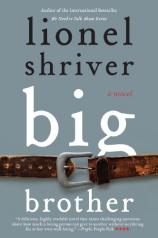Big Brother
Review
Big Brother
Although she's been publishing books since the 1980s, Lionel Shriver has gained a recent reputation for writing smart, literary novels that address social and cultural concerns, thanks to works like her 2003 breakout, WE NEED TO TALK ABOUT KEVIN (about school violence and maternal ambivalence, and 2010’s SO MUCH FOR THAT (about failures in the American health care system). Now, in her latest work of fiction, BIG BROTHER, Shriver explores another current crisis and how it affects one ordinary family.
"Pandora's longing to help her brother, combined with her desire to revive her struggling marriage, will ring true for many readers, as will her struggle to confront the shame of her brother's condition and her own fixations with food and dieting."
Pandora, at the age of 41, has finally gotten what she always wanted. She has a more or less happy family, thanks to her recent marriage to Fletcher and her adoption of his two now-teenage children. After years of killing herself trying to get a struggling catering business off the ground, she has found huge career success --- the kind that gets you on the cover of Forbes --- with a line of custom-made pull-string dolls that poke fun at people's friends and family. Sure, Pandora has a little tension at home, since her husband, whose professional life is not nearly as successful, has taken to obsessive cycling and ultra-low fat cooking. Sure, she's getting a trifle bored with her business. And sure, she'd love to lose the 15 pounds she's gained since her marriage. But things are pretty good overall.
That is, until Pandora gets a phone call informing her that her older brother Edison, whom she hasn’t seen in several years, is going to be making an extended visit to the family's home in Iowa. Edison, a jazz pianist who's a little down on his luck, has never gotten along particularly well with Pandora's husband. But the family has no idea what's in store this time. When Pandora picks him up at the airport, she hardly recognizes her brother, who has grown so obese that he needs an extra-wide wheelchair to make the trek through the airport. Pandora and her family are alternately shocked, disgusted and saddened by what's happened to Edison --- or is it rather what he's done to himself?
BIG BROTHER takes on several social issues --- including the prevalence of obesity in America and the parallel rise in lucrative weight-loss programs and products --- as well as several interpersonal issues, such as the tensions that arise in a marriage, the responsibilities of adult siblings to one another, and the hollow satisfaction afforded by material success.
Pandora's longing to help Edison, combined with her desire to revive her struggling marriage, will ring true for many readers, as will her struggle to confront the shame of her brother's condition and her own fixations with food and dieting. The twist that Shriver introduces near the end of the novel will certainly get readers talking, too. Some may find it a cop-out or a disappointment, but others will see it for what it is: a particularly insightful way to show that Shriver's story is not "just" about weight or weight loss but is instead about addiction and addictive behaviors of all types --- the socially accepted as well as the socially shunned.
Reviewed by Norah Piehl on June 7, 2013
Big Brother
- Publication Date: June 10, 2014
- Genres: Fiction
- Paperback: 400 pages
- Publisher: Harper Perennial
- ISBN-10: 0061458600
- ISBN-13: 9780061458606




